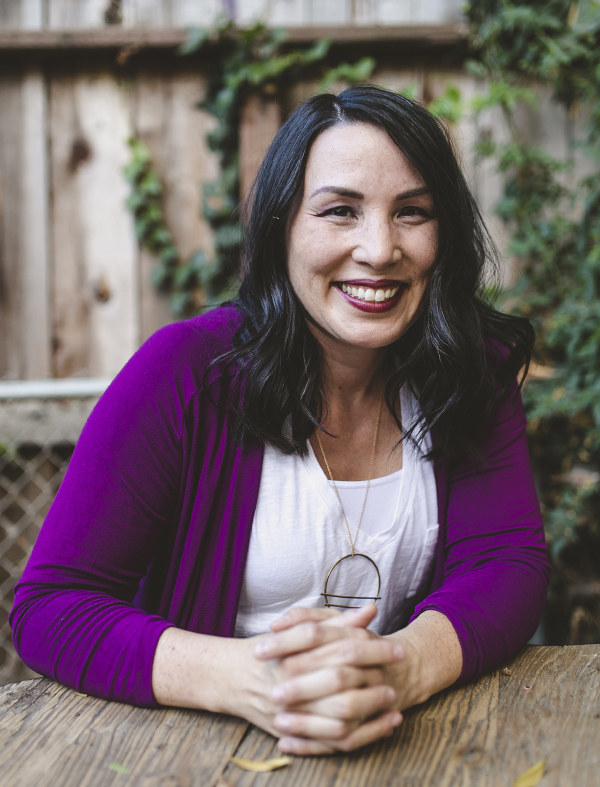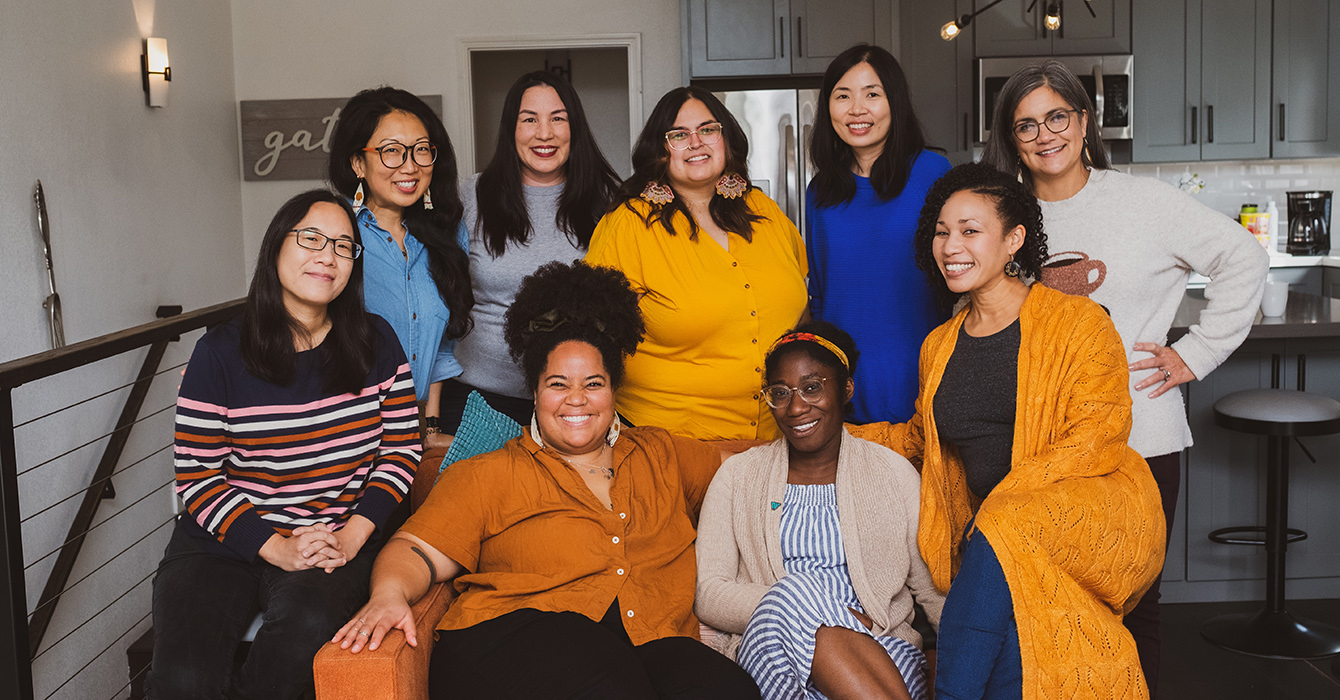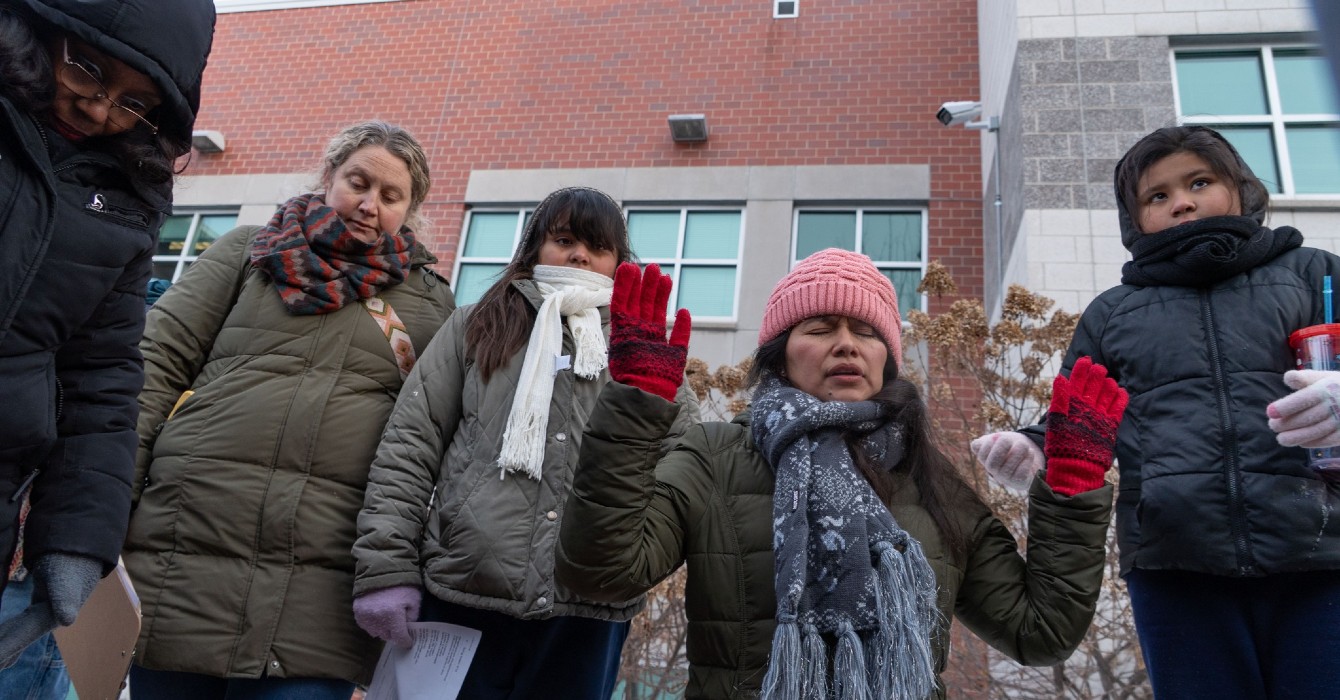Erna Kim Hackett founded Liberated Together as a place for women of color and queer folks of color to speak freely about trauma they’ve experienced in faith spaces and make a different faith experience for themselves.
“I often talk about Liberated Together cohorts as a kind of rescue work,” Kim Hackett said.
The organization offers cohorts that range from eight weeks to a year, one-on-one mentoring and a recently launched spiritual direction school.
“As we know, there has been a great deal of reckoning in the last couple of years,” Kim Hackett said. “There’s been such a wild amount of trauma, and I think people are in so much pain.”
Kim Hackett hopes that cohorts led by and centered on women of color and queer folks of color can alleviate that trauma and reassure people that they aren’t alone. Instead, through the cohorts, perhaps they can find a space that fully acknowledges their experiences, their concern for social justice and their faith identity.
Kim Hackett launched Liberated Together in 2020, just before the start of the pandemic.
She spoke with Faith & Leadership’s Chris Karnadi about the organization, the choices that went into designing the cohorts, and her hope of Liberated Together’s impact. The following is an edited transcript.
Faith & Leadership: What is Liberated Together?

Erna Kim Hackett: Well, our purpose statement is Liberated Together is a space for women of color, queer women of color and nonbinary folks “to explore liberated and embodied theology, decolonized approaches to social justice, and radical solidarities across ethnic lines. Healing together, so we can co-create a way forward.”
For me, what that means — because it does require some explanation — is a space that is truly for women of color, and it comes out of having been in church spaces, multiethnic spaces, nonprofit spaces, social justice spaces and finding that everybody is happy to use women of color but very few places are truly for us. So we want to build community that is for us and have conversations that are not just reactive and meant to put us back into white institutions.
Social justice spaces (often, men-of-color-run social justice spaces) are still very extractive to women of color. And so we want to create ways — points of connection and learning — that truly serve us and help us move through theological conversations, justice work and racial justice conversations in a way that isn’t so reactive and white-centered. That was the thinking.
We do a lot of cohorts and then some one-on-one mentoring, but cohorts have been the main way that Liberated Together has existed. And then we recently launched a thing called Liberated Together Spiritual Care, which is a team of spiritual care practitioners who are creating a spiritual direction school and a network for spiritual directors.
F&L: How have you seen Liberated Together impact people?
EKH: I know so many women of color, queer folks of color, nonbinary folks who want to have spiritual practices and want to connect with the Creator. But the majority of ways that we’ve been given are so triggering and so traumatizing, so housed inside hetero patriarchy and white supremacy. So just to have people who understand that and who can help create spaces that feel safe and invitational is refreshing.
So many of the folks who come into cohorts say this is the first time they’ve ever been able to bring their ethnic identity, their interest in social justice and the fact that they follow Jesus in some way into one space. There’s this big exhale that happens in their bodies when they feel believed in everything they say. So it becomes kind of like rescue from trauma and showing that there could be another way.
One of the aspects of white supremacy is making us feel powerless. It makes you think someone else has to create the container for you — you feel like it’s the only way. But it’s not; we can make other ways of being in community.
People really are thirsty for that but feel paralyzed and unable to move forward. And so they’re like, “OK, I don’t want to go back into those same systems,” but they don’t know what else to do. There’s still so much internalized suspicion that we have of our own ancestral traditions or anything that isn’t rigidly within a particular system box.
F&L: What are the cohorts like?
EKH: One cohort that we’ve done the most is one for Asian American women and folks, and that one really came out of the racial reckoning that happened after the murder of George Floyd. The group emerged from processing seeing an Asian American cop at the scene and delved into police violence, Asian America and Christianity.
The structure of that cohort is learning a racial framework, learning about a Black/white binary and how the model minority myth fits into it, learning the four pillars of white supremacy, and then we have a little bit of practice.
We spend time connecting our stories to the things we’ve learned. Then we look at patriarchy within our own communities, and then we look at misogynoir. So that cohort was really about learning about anti-Blackness, but we did the work by learning more about our own experience and story so that we could have a more empathetic compassion across racial divides.
We have some shorter cohorts, which meet over eight weeks, but longer cohorts run for nine months to a year, and they have an in-person component. The cap for a cohort is 20, and smaller cohorts are between 10 and 12 people.
And it’s high commitment. If you’re doing an eight-week cohort, I need your commitment that you’re going to be at every session. We are looking for really active engagement and try to be really clear that if you don’t have emotional capacity to do the work right now, that’s totally fine, but then don’t take a spot.
What’s beautiful about these cohorts is having an expansive space to build authentic connection so that when racial crisis happens, we show up for each other. So much of the time that people are trying to do racial solidarity work, they are trying to create solidarity in times of crisis. You cannot build authentic community in crisis.
For example, when the Atlanta spa shootings happened, there was a beautiful thing that happened between Asian American women and Black women in a cohort. Because, one, the Black women had experienced Asian American women showing up for them very consistently over the course of the year. But also, there was so much trust and relationship built outside of crisis.
To me, that’s what I’m talking about when I talk about radical solidarity. We rarely have space to build that kind of relationship. It’s often crisis driven. So to build that kind of loving, expansive, joyful connection over time and then show up in racial crisis is just one way that we have community, and it’s really wonderful to be able to have that broader narrative.
F&L: Are there leaders for each cohort?
EKH: I led the majority of Asian American cohorts with a co-facilitator until recently. Every cohort, with the exception of a couple, has at least two facilitators, just to have a collaborative approach to learning, to have multiple voices.
Most of them are me plus somebody else, but we did have a “Luchadores” cohort, which was led by two Latina women, and we had “Night Vision” cohort, which was led by two Black women.
So it’s almost always two facilitators. I think it’s healthy, and it’s also a correction for some of that single-personality-driven toxicity that many of us are recovering from.
F&L: Do people apply to join? Do they pay?
EKH: Yes, people have to apply. I think it is important to be intentional about the creation of the community. And the majority do pay.
I started Liberated Together as a for-profit business. I fundraised for 20 years, so I refused to get on a grant cycle. I was like, “I’m not begging people for money.” But people just started donating, especially in 2020 to 2021.
So I got a fiscal sponsor and eventually did open a 501(c)(3), because people were giving so generously and with so little asking. So yes, people have to pay. We do offer scholarships, and until this point, we’ve been able to say yes to every single scholarship ask that has come through.
The application process is also important to make people clarify their thoughts around LGBTQ rights and queerness. It’s really important to me to be a community that is more than affirming and instead be a community that is really celebrating queer folks.
I’m really clear with people that we’re not a church. A church has to let almost everybody in, and we don’t. And I love it — I love being able to curate and nurture the community.
F&L: How do you make sure people aren’t replicating negative patterns of relationships from other spaces?
EKH: I feel like we do so very gently, because people who come into the space have to choose to be there.
I think a lot of justice work can feel very mean, and by that I mean I think that some people think justice work means catching people out on things and talking about those people over there. But it’s really humbling to realize that the fire was coming from inside the house all along.
I have found that there’s a real willingness to be self-reflective. Because people feel so believed in their own experience, there isn’t as much fear.
Justice work isn’t primarily about talking about how terrible things are. Just keeping track and talking about how terrible things are doesn’t actually feel liberative. We know how bad it is; we’ve experienced it.
Justice is this joy and connection when you feel believed. It’s being able to exhale and relax in a space. It’s about creating a world we want to live in and to get a taste of that so you can be different and more yourself outside of whiteness and patriarchy.
F&L: So what are some things that you learned by launching this organization? What are some things that you had to change or pivot on?
EKH: From a business perspective, quite frankly, I was lucky to launch in 2020, because I was talking about race, theology and women of color, and all of a sudden, everyone was stuck at home, really willing to try stuff online, and they wanted to learn about that stuff.
I had to do a lot more thinking after things started to open up and people’s attention span and engagement around racial justice pretty quickly deflated.
In terms of other lessons, I realized that you can do so much work and yet still really believe that somebody else has to build something for us. That just takes time to heal and recover from as a woman of color.
It comes up in a lot of my coaching work. Even if on paper you’re like, “I’m a leader” or, “I believe women are entrepreneurial,” do you believe that you can build the churches you want to be a part of, the networks, the schools?
That belief really needs to be nurtured. Like when I gathered these spiritual directors to start a spiritual direction school and I asked, “Do you want to start a spiritual direction school?” Every single one of them said the exact same thing: “I’ve been dreaming about this for years.” But no one has actually done it.
When I talk to women of color, I ask, “Would you like churches that center women of color and queer folks?” They’re like, “Absolutely.” “Great, do you want to start that?” And the answer is often, “No.”
For women, starting new things is difficult because of this deeply internalized belief that we should be No. 2. There’s a belief that I have to find someone else’s container or organization and then I’ll bring my excellent leadership to it.
Creating the container? That takes deep work, even for wildly competent women and queer folks, especially for people who have been formed by Christianity.
There is a depth of internalized patriarchy, because all of our models of starters and entrepreneurship are men with a very particular type of energy that we do not identify with, and we think to ourselves, “Ugh, I don’t want to be like that.”
You have to have the courage to experiment, explore. One thing I talk about is that we’re not going for perfection. We’re not going for flawless; we’re just going to do it.
Us just doing it is the liberative work. Perfection is not liberative work. Us believing that we can create the space for us — that’s the justice work.











